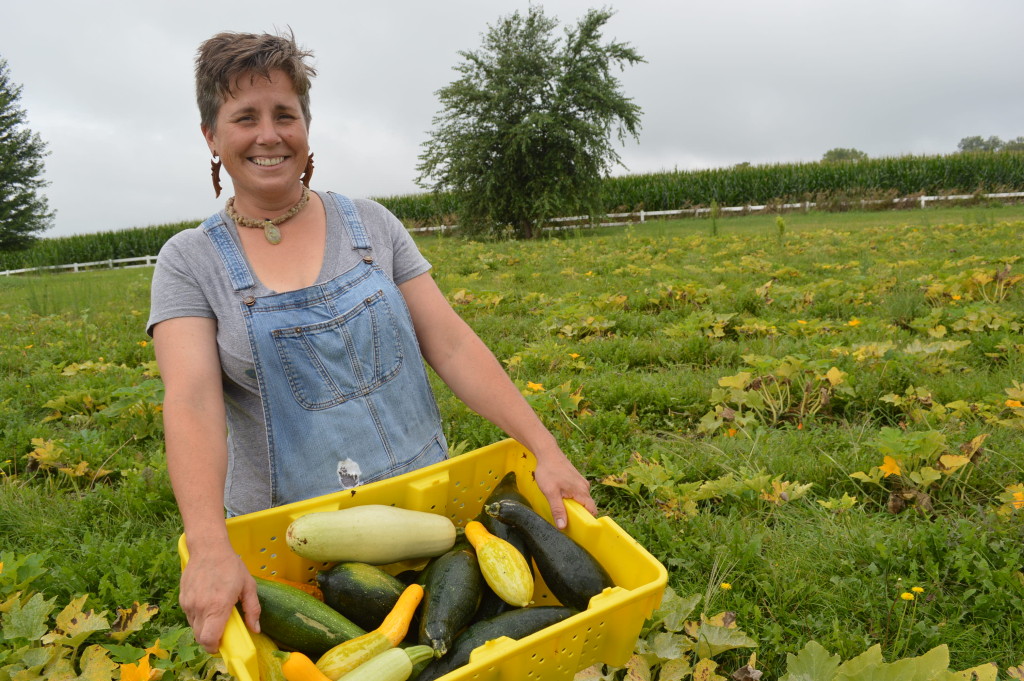
Sonia Kendrick is shown with some of the squash she harvested in 2015. Kendrick, the founder of Feed Iowa First, was named one of Radish Magazine’s 2016 award winners for her work. (photo/Cindy Hadish)
By Cindy Hadish/for Radish Magazine
When Sonia Kendrick came to understand the issues with Iowa’s food system, she rolled up her sleeves and worked to make changes.
Kendrick, 38, of Cedar Rapids, founded Feed Iowa First in 2011 to address the challenge of people going hungry in a state that prides itself on being able to feed the world.
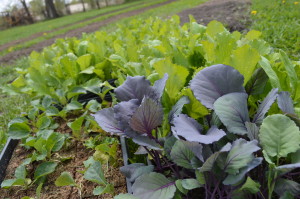
Cabbage seedlings are ready to be transplanted earlier this spring to a Feed Iowa First site in southeast Cedar Rapids. (photo/Cindy Hadish)
“Our food system is not sustainable,” said Kendrick, who has a master’s degree in sustainable food systems from Iowa State University. “It’s in trouble.”
Even while it boasts having the best soil in the world, 90 percent of food consumed in Iowa has been transported more than 1,500 miles; one of several issues that concern Kendrick.
An Afghanistan war veteran, where Kendrick saw people suffering from hunger, she earned a degree in agronomy and began tackling the same problem in her home state.
Kendrick was one of three women veteran farmers featured in the documentary film, “Terra Firma,” and last year was honored in Washington, D.C., as one of 10 Women Veteran Leader “Champions of Change.”
Feed Iowa First partners with churches, community agencies and businesses, finding open space to grow fresh produce to provide to Iowans in need.
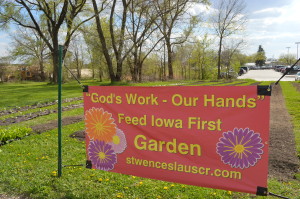
Feed Iowa First has grown from one location to 24, including this site across from St. Wenceslaus Church in Cedar Rapids. (photo/Cindy Hadish)
Kendrick points to more than 800 acres of grass that surrounds churches in the Cedar Rapids area.
Just 500 of those acres could produce enough vegetables to reach the organization’s goal of 2.5 cups of vegetables daily for the 26,000 Linn County residents who experience food insecurity: those who don’t have enough food to eat or access to nutritious food.
From one church site its first year, Feed Iowa First has grown to 24 locations in the Cedar Rapids area, including businesses such as Rockwell Collins and GE Capital. Last year, with the help of 150 volunteers, the nonprofit grew, harvested and donated 30,000 pounds of produce — valued at $53,000 — to people in need through food pantries and agencies, such as Horizons Meals on Wheels, which delivers daily meals to home-bound adults.
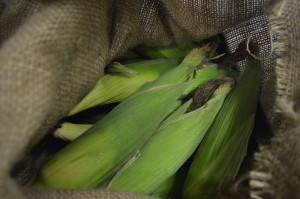
Sweet corn was among the fresh produce given this summer to people in need through the work of Feed Iowa First. (photo/Cindy Hadish)
Mar Joan Rhodes, site manager for Meals on Wheels, said Feed Iowa First has provided clean, fresh tomatoes, beans, squash and more to use in meals.
“It’s been a wonderful asset to us,” Rhodes said, noting that the produce would otherwise have to be purchased out of the agency’s budget.
Kendrick wants to do more than drop off a load of vegetables, however. Agencies and food pantries need equipment to better use the food, she said, citing green bean cutters as an example.
“If they had the right equipment, it could provide several meals,” Kendrick said, noting that 800 pounds of green beans were dropped off at Horizons in one delivery this summer. “It’s good to grow food for people who need it, but we need something in-between.”
The same is true for aspiring farmers. The mission of Feed Iowa First is not only to grow food, but to support beginning farmers through training and investments that ensure the next generation of farmers and food production.
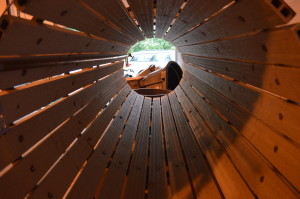
A new root washer can speed up the process of preparing the fresh produce from Feed Iowa First for distribution. (photo/Cindy Hadish)
Kendrick notes that beginning farmers face hurdles, not only in purchasing land, but in buying equipment needed to farm.
A new root washer is among the equipment that farmers or community gardeners could use. Last year, it took Kendrick eight hours to wash 600 pounds of daikon radishes by hand.
“It would take me just an hour with this,” she said, pointing to the new cylindrical washer inside the Feed Iowa First packhouse in Cedar Rapids.
The organization previously worked out of a church kitchen, so the site, leased for $1 annually from nearby Cargill, is better able to handle larger quantities of vegetables.
Kendrick also raised money to retrofit a bus that goes into neighborhoods to directly deliver fresh produce to people in need.
From its inception, she hoped Feed Iowa First would also provide a living wage to farmers-in-training, but despite its success, even Kendrick donates her time.
She is grateful for donations that come from businesses, but so far, no steady source of funding has come to provide wages.
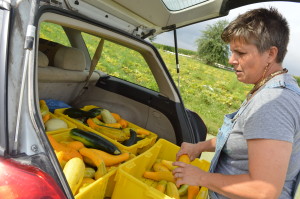
Sonia Kendrick loads squash into her car this summer. Kendrick works 50 hours per week for Feed Iowa First, but gets no compensation, as she continues to search for funding. (photo/Cindy Hadish)
A single mom, Kendrick works 50-hour weeks for the nonprofit for free, while providing for her two daughters, ages 9 and 11, on disability checks she receives as an Army veteran.
She was diagnosed with post-traumatic stress disorder after returning from Afghanistan.
Turning to the soil was her way to cope with the trauma, she said, noting that 22 veterans commit suicide every day.
Feed Iowa First has given her the will to move forward.
“I think the soil microbes have a way of healing us,” Kendrick said. “I don’t think I’ll ever be 100 percent OK, but I’ve found a way to feel that I have a purpose.”
Learn more at: feediowa1st.com and read more about healthy living at: Radish Magazine
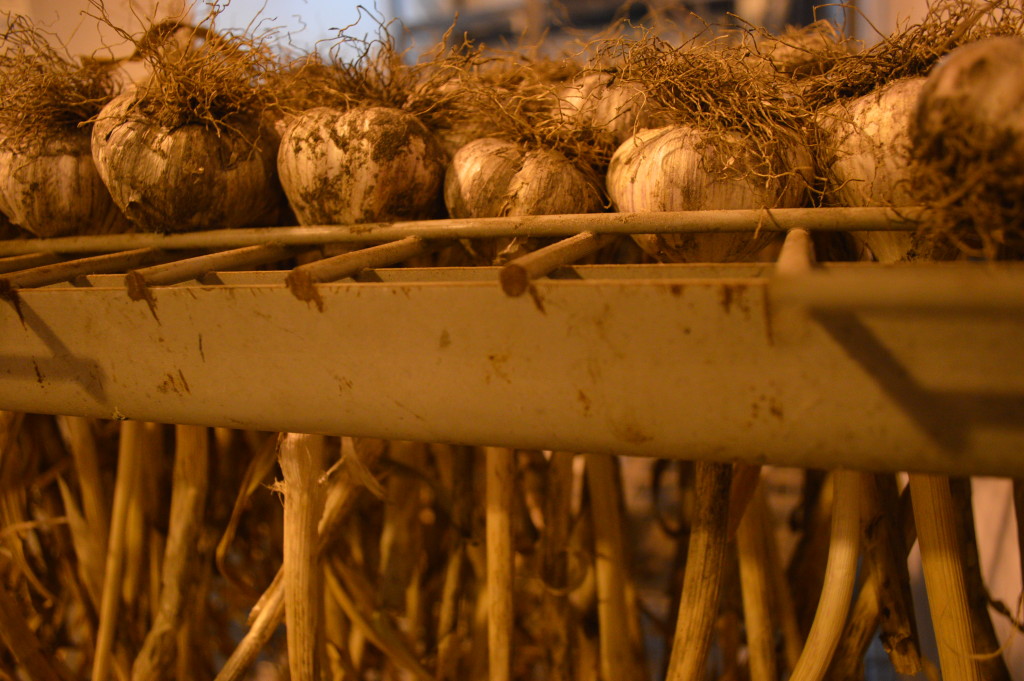
Garlic is among the produce grown in 2015 through Feed Iowa First, a nonprofit founded by Sonia Kendrick of Cedar Rapids, Iowa. (photo/Cindy Hadish)

So uplifting to be given hope for the future of our wonderful state!!!!
Iowa once grew such a variety of veggies, fruits, nuts & herbs & now, as we know is overgrown with soybeans and corn that is not even intended to healthily feed mouths—- such a depressing fact…However!!! Sonia’s vision & elbow grease instills true hope in my heart!!!!!
Thank you a thousand times- Sonia & all of those who now assist her & will in the future!!!!!!
Yipeeeeeee!!!!!